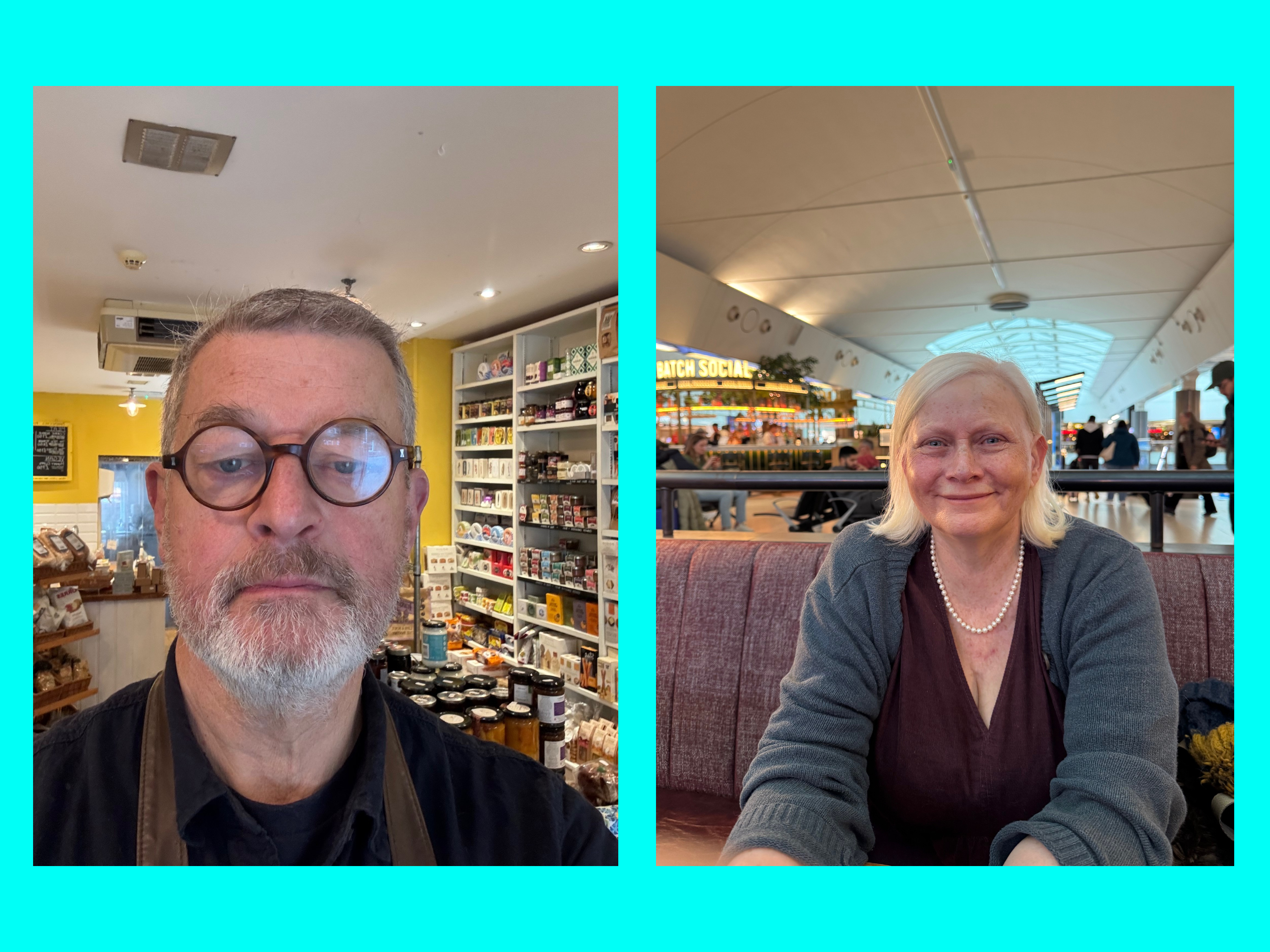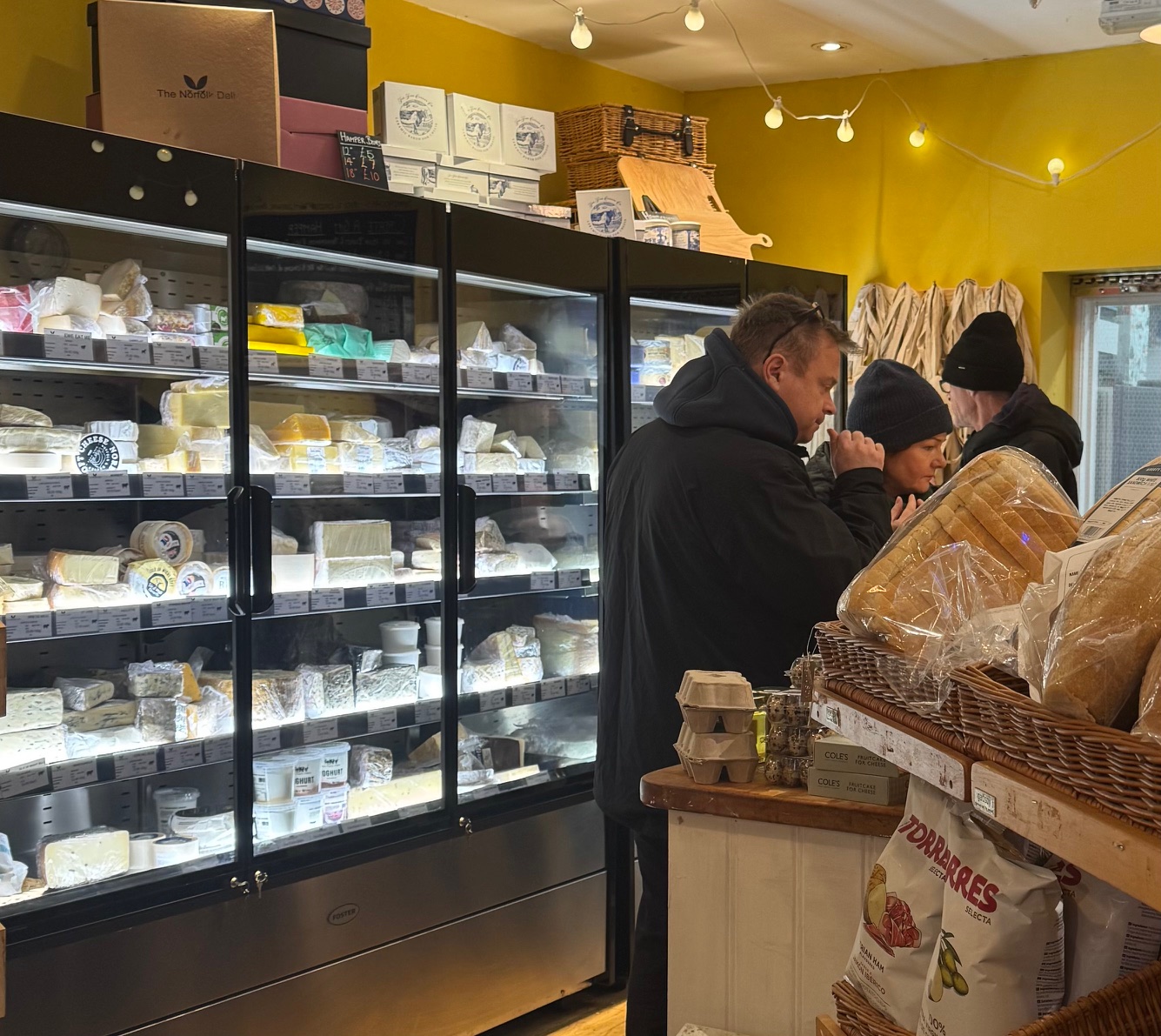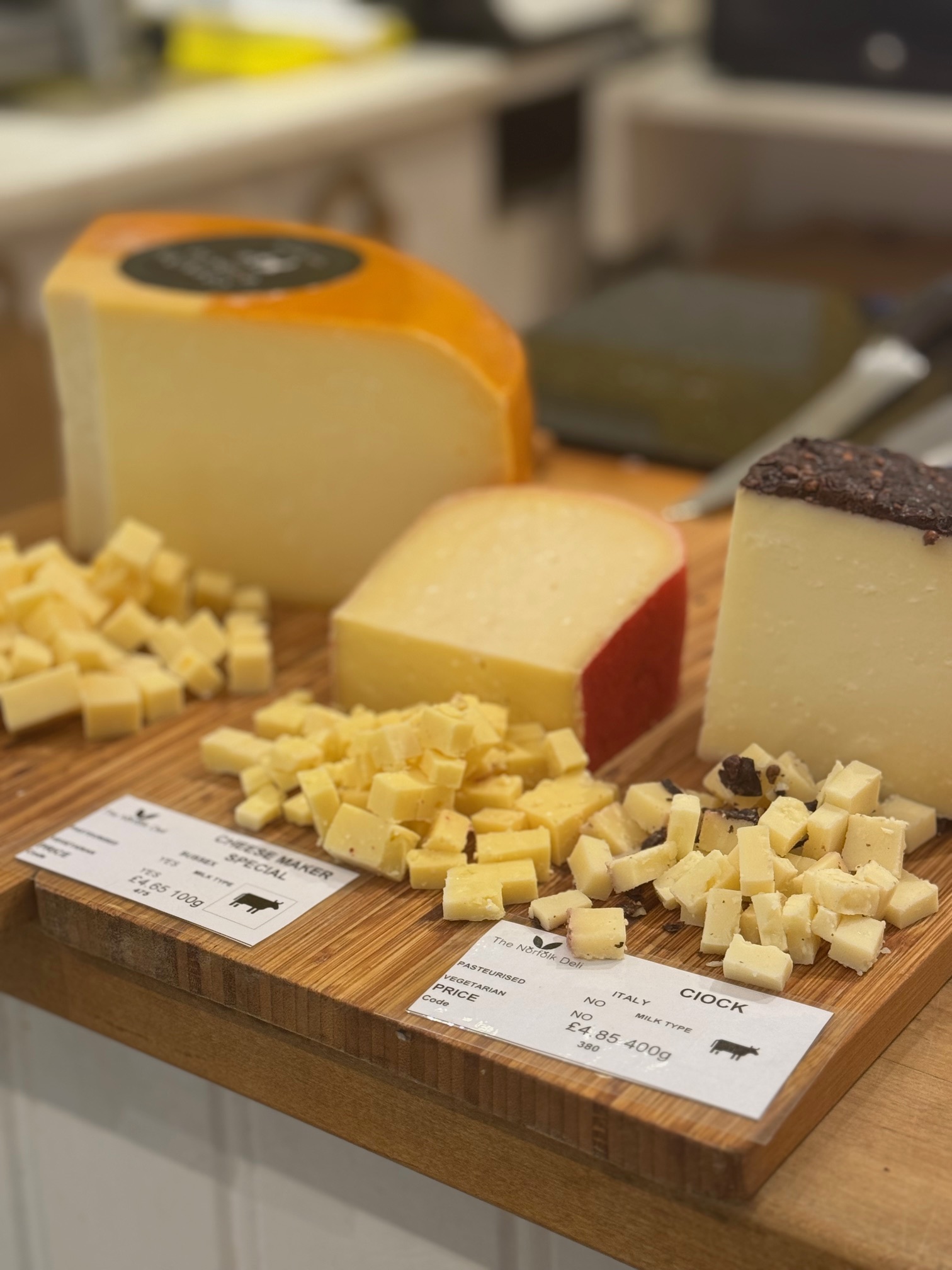Free digital copy
Get Speciality Food magazine delivered to your inbox FREE
Get your free copy
For the owners of The Norfolk Deli, perched on the tip of the North Norfolk coast at Hunstanton, having the name of the county emblazoned across the frontage of the shop brings a great sense of pride.
Norfolk is the place Mark and Rosie Kacary call home, the place they love, and a never-ending source of inspiration for their business, encompassing both the deli and a cafe. The county spills over with good things to eat and drink, from farmhouse cheeses and bean-to-bar chocolate, to traditional and craft beers, and award-winning preserves.
All feed into the ethos of The Norfolk Deli, which has become a mecca for food lovers in the area on foot (and by car), as well as an online extension of home for those who’ve moved further afield, who might grab a taste of the region via a hamper, cheese box or parcel of goodies shipped to wherever they might be.
Remarkably, despite their food-loving leanings, Mark and Rosie, didn’t follow this path until later in life.
Forty years ago Mark was working in the IT field, while Rosie had carved out a career in midwifery - though she later managed Dobbies Food Hall in Cirencester, with input from Mark helping to make it one of the most profitable in England.

The “life-changing” decision to open their own food business came naturally as their children grew up. “We were at the point where our eldest had just finished uni, and our youngest had just finished with education,” says Mark. “Rosie grew up in Norfolk and went to school in Norwich, and she was getting a yearning to come back here. We’d visited a number of times and decided to basically put everything on the line.”
The couple sold their house and began looking for opportunities. Mark couldn’t shake the idea of running a deli, inspired by his family. “My father worked in the restaurant industry, in top London casinos, and I worked with him from time to time. It felt like it was in my blood!
“We looked at a number of difference places, and came across a business in Hunstanton that, at the time, was a wine cellar and deli. Walking around, apart from the fact the building was attractive, downstairs it had a proper wine cellar. We left after the first viewing thinking it was a bit ‘meh’ in the end, but overnight we came to the realisation we could do this. We could transform it. We saw the potential.”
Slowly, slowly Mark and Rosie brought in the changes they wanted to enact, with a mantra from day dot to veer away from being a wine specialist, and towards high quality food.
“With the name it was rather like the classic line ‘it does what it says on the tin’. The Norfolk Deli had to have a focus on Norfolk produce, but we never set out to be entirely, 100% Norfolk. We can’t find anybody here who makes crackers for cheese for example. We look to Norfolk first, and if we can’t find something made in Norfolk, we go further afield…but not too far afield.”
Inspiration also came from Mark’s epicurean childhood growing up in Kensington and Chelsea, where he laughs that, because they were only around 20 minutes along the Fulham Road, his dad used to call Harrods his corner shop.
“It’s less impressive, I think, now, but in the 60s and 70s the food hall there was awe-inspiring, with its fish displays and things like that. Our vision was to recreate our own mini version, combining those memories with the idea of a proper Italian-style delicatessen, or the kinds of places you find in France or Spain, filled with the ingredients to put together a meal.
“It disappoints me to say the word ‘delicatessen’ now, for a lot of people, is a way of saying cafe. If people want to go upscale or upmarket they will sell deli crisps, or deli sandwiches. In my world, a deli sandwich is something made to order, with fresh ingredients, on the spot. And that’s what we do.”
Mark said they wanted the deli to be an “Aladdin’s Cave” where customers feel overwhelmed by the cornucopia of choice. Where they can invest their hard-earned cash in artisan-made food and drink not found in supermarkets.
“It’s those stories that are so important. In a supermarket, jam is just jam. But we can tell people about makers like The Garden Pantry, for example. Neil and his wife grow the majority of ingredients that go into their jams on their allotments, or they come from other people’s allotments and gardens. Then they use their imaginations to make flavour combinations that are seasonal throughout the whole year.
“It was always our vision to promote and support small businesses and their products, and to be an alternative to supermarkets in that respect.”
Like any business that’s bedded in (they’ve been trading for 11 years), The Norfolk Deli has gone through a raft of changes, tweaking the offering where necessary to work with the ebb and flow of what shoppers do and don’t want, bringing in new suppliers, and saying goodbye to makers who’ve moved on to pastures new.
When the deli first opened, Mark says they took quite a traditional route, selling a plethora of different salamis, hams, pates and more. “Then there’s a case of the demographics changing over a period of time. You’ll find certain things aren’t selling or people are coming in and asking for specific items. You could stick to your guns and be determined about only having certain ranges, but then you’re just going to end up with waste.”

The deli’s own example of this is when they converted the wine cellar to have a wet fish counter. “We discovered a lot of people said they wished they had access to a wet fish counter, but they used it almost as a cheap version of going to the local Sealife Centre – all the attractions already dead rather than swimming in a tank. They’d say, ‘can I look at that fish?’, and we’d take it out and they’d say, ‘OK, no that’s alright thanks, I might come back later’. Inevitably they never did.”
Eventually a few tables and chairs were put downstairs instead for an informal coffee/tea/sandwich offering, until the opportunity arose five years ago to take on premises a couple of doors down, opening a dedicated Norfolk Deli Cafe. “They’re two separate enterprises,” Mark explains, “but we make the sandwiches and sausage rolls and quiches, and my son makes all the cakes and traybakes.”
Cheese is very much Mark’s wheelhouse, and there’s always a huge selection (between 80 and 120 varieties) in stock depending on the time of year, largely from Britain.
It’s not just the sheer diversity and deliciousness of these products that appeal to Mark and Rosie, but the differentiation having access to smaller, craft-made cheese gives them compared to the multiples. Many of the makers they work with are small enterprises, not geared up to be cogs in the larger food industry…but perfect for lining the chiller of a specialist shop that can really help consumers ‘get’ their products.
“You won’t find anybody in most supermarkets able to talk about certain cheeses, or to give you a taste of the cheeses before you buy. We can do that. And, importantly, it’s not all pre-shrink-wrapped. People can come in and ask for just 100g of Binham Blue, and that’s what we’ll give them!”
As the artisan cheese world continues to grow in the UK, so does what’s on offer at the deli. But how to give each wedge, round or block the visibility it deserves?

“Just over a year ago Foster Refrigeration were looking to launch a new multideck with doors on it and improved air flow, all sorts of things,” Mark reveals. “They came to us, because we’re just down the road and we knew them, and asked if we’d like to have one. Rosie said, ‘what’s the catch?’ but it was just to provide them with some data and information. The long and short of it is, they put one in, and added some probes to gauge how much electricity it used compared to our open-fronted multideck, and what the cost difference was. Our open-fronted deck was costing us, let’s say, £5 per day, whereas this is £1 a day. We ended up buying a three-door one to give us five doors, of five levels of cheese.”
That’s a lot of cheese. All displayed beautifully – each one getting an equal visual billing. But how does this impact the sale of cheese, especially for a business that prides itself on personal service?
“Some people think it’s a case of opening the door and grabbing 3kg of cheese. We manage that by keeping an eye, and if it looks like someone’s going to open one of the doors, we ask what we can do to help. But we like that they can see the cheese really well. Each level is lit up, and it’s easier for them to walk up and down looking, rather than the cheeses being stacked on top of each other in a traditional serving counter.”
The deli keeps the ‘cheese journey’ simple for customers, arranging the varieties in families (goat, blue, or from Norfolk, for example), giving the team licence to explore the cheeses properly with customers, getting them to try things in each ‘category’ they might never have seen before. “For us, cheese is a very interactive thing.”
One of the most important parts of being a deli owner or cheese specialist, adds Mark, is sharing your knowledge and expertise. Leading people who are a bit unsure about anything other than the usual Cheddar or Stilton by the hand. “Cheddar is always going to be successful, but we find people love our Norfolk cheeses once they find them, especially Mrs Temple’s Binham Blue. Around this area it’s as if there’s no other blue cheese beyond it. And there are obvious favourites like Baron Bigod, which we’ve been selling since Jonny and Dulcie started making it. Norfolk Dapple is also popular, and Suffolk Gold. Then at Christmas they tend to go for things like Chaumes.”
Online the likes of Grand Noir, alongside Snowdonia Cheese Co truckles, and Doddington have been hitting the spot for ‘virtual’ customers.

Too many good things to choose
One of the hardest questions any deli owner or manager will be asked is ‘what do you recommend?’, largely because, of course, they’re in charge of buying decisions on the whole, and they’re unlikely to select anything to go on-shelf if they’re not super passionate about the maker, quality and taste.
Mark’s selections from The Norfolk Deli, if he were grabbing a few bits to take home for a ‘picky dinner’ include a range of cheeses. “Delice de Bourgogne, Grand Noir, probably a good Cheddar depending on my mood, and an Old Winchester or Cornish Kern. Then there’d be charcuterie from Marsh Pig, and some tinned fish…perhaps some Rainbow Trout Smoked Over Oak from Sea Sisters in Cornwall.”
Alongside, Mark says you “can’t go wrong” with a few Peter’s Yard sourdough crackers. “They tend to be subtle, so they won’t overpower the taste of the cheese.” As for accompaniments? “I really like Candi’s Chutney’s Parsnip and Chilli Chutney, or Spiced Carrot Chutney.”
Other in-store favourites include Hot Star Honey, Brick frozen pizzas, chilli jellies from Chillies Galore, and Butter Bike peanut butters. “I’m a huge peanut butter fiend, and I really enjoy their Everything Bagel peanut butter.”
To be a good deli you “need to realise it’s different to any other shop”, Mark explains. “You need to be able to look around, thinking, ‘I haven’t seen that before’ or ‘that looks really interesting, I want to buy that’. Delis should be filled with things that get the culinary juices flowing, compared to walking down an aisle of strip lights and seeing the same products over and over again.”
Key to survival, he adds, is being flexible, and adapting to market conditions and customers. That includes not ignoring selling online, something The Norfolk Deli ramped up during the pandemic. “We attract customers living in California, or New Zealand who have relatives in Norfolk and want to send them something as a Christmas present. They haven’t walked past the shop in Hunstanton, they’ve found us online, and if we didn’t have an online presence, we would be missing a trick. Surprisingly, we have so many orders from Scotland!”
A multi-level business approach is the way forward, Mark continues. “You have to accept these days that you need to engage with some form of social media, and to have a website as well as bricks and mortar. They’re fires that need stoking and feeding on a regular basis. It’s about having more than one revenue stream.”
The deli’s best ever year, to date, was 2020, at the height of the Covid pandemic, when the shop took thousands of pounds more than usual. “That really made us recognise the value and advantage of being online. Small businesses like ours do need to have irons in both fires!”
Something Mark likes to wax lyrical about (other than cheese) is the intrinsic value to communities of independent food shops, and their power to showcase the bounty of the local area. “My view is local products are the core of these kinds of businesses. If you’re not doing ‘local’ how are you being different? If you choose to only buy from the big wholesalers, if you’re not careful you can become the deli equivalent of a supermarket, stocking the same things as everyone else. You could lose your identity.”
Rosie makes the majority of purchasing decisions and, says Mark, purposefully doesn’t bulk buy multiples of the same thing to keep the deli’s shelves looking fresh and appealing. “It’s about giving people a wider variety of choice and, once again, going back to that ‘wow factor’. Quite often, when we’re out and about we’ll wander around various shops and we can say, ‘oh they’ve been buying products from this supplier or X, Y, Z business’, and that’s what we steer away from.”
It can be hard work, going direct, spending time looking for niches, but it’s worth it, he adds.